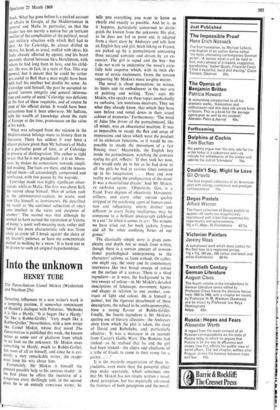Into the unknown
HENRY TUBE
The Pantechnicon Lionel 1\1 kkin (Weidenfeld and Nicolson 25s) Detecting influences in a new writer's work is a tempting pastime, if somewhat reminiscent of Hamlet's dialogue with Polonius: 'Methinks it is like a Hardy.' It is begun like a Hardy.' 'Or like a Robbe-Grillet."Very much like a Robbe-Grillet.' Nevertheless, with a new writer like Lionel Miskin, whose first novel The Pantechnicon is published this week, the known serves as some sort of platform from which to set foot on the unknown. Mr Miskin owes something to Hardy, much to Robbe-Grillet, but most of all to himself, and since be is evi- dently a very remarkable writer, the reader must keep his wits about him.
Fortunately, Mr Miskin is himself the greatest possible help to his anxious reader: in the first place he offers the incentive of a dangerous story thrillingly told, in the second Place he is an entirely conscious writer, he
tells you everything you want to know as clearly and exactly as possible. And he is, as it happens, particularly concerned to distin- guish the known from the unknown. His plot, as he does not fail to point out, is adapted from a short story by Andreyev and tells how an English boy and girl, hitch-hiking in France, are picked up by a pantechnicon containing three escaped convicts and driven by an ex- convict. The girl is raped and the boy—but I do not want to undermine the novel's care- fully held suspense which, with its twin ele- ment of erotic excitement, forms the tension supporting Mr Miskin's more weighty matter.
The novel is about perception; its nature, its limits and its embodiment in the two arts of painting and writing. 'Eyes,' says Mr
Miskin, who speaks on these topics unabashedly ex cathedra, 'are notorious deceivers. They see
what they already know, that which they have seen before and noted down in their visual cabinet of memories.' Furthermore: 'The mind of Jules [the driver of the pantechnicon], like all minds, was an obsessional machine. It was
as impossible to steady the flux and surge of impressions and ideas which were the product of its elaborate functions, as it would be im- possible to steady the movement of a fast flowing river.' Meanwhile, the English boy inside the pantechnicon, watching the convicts eyeing his girl, reflects: 'If they took her now, they would only do to her as he had done to all the girls•he had at various times conjured up in his imagination . . . Here and now reality was aping the configuration of the mind. It was a materialised dream.' And Mr Miskin, ex cathedra again: 'Objectivity, then, is a fraud. Even degrees of objectivity. Movement, stillness, and every other outside quality stripped of the catalysing agent of human emo- tion and subjectivity, utterly distinct and different in every living intelligence, may be compared to a brilliant photograph exhibited to a cat.' So when it comes to art: 'No wonder we have cried out for book jackets, frames and all the other confining boxes of our games.'
The classically simple story is given com- plexity and depth not so much from within, though there is a certain amount of conven- tional psychological underpinning to the characters' actions, as from without. Or rather, one might say, the story and its commentary interweave like two broad sweeps of colour on the surface of a canvas. There is a third ingredient—as it were, the background to the two sweeps of colour—in Mr Miskin's detailed descriptions of landscape, movement, figures and shapes in relation to one another, con- trasts of light and colour. He is himself a painter, but the rigorous detachment of these descriptions, the refusal to be anthropomorphic, have a strong flavour of Robbe-Grillet. Finally, the fourth ingredient is Mr Miskin's sparing use of literary allusions: the Andreyev story from which the plot is taken, the story of David and Bathsheba, and, particularly effective: 'It was a massacre in an account from• Caesar's Gallic Wars. The Romans had tricked—as he realised that he and the girl had been tricked—the elders and chieftains of a tribe of Gauls to come to their camp for a parley. . .
It is the masterly organisation of these in- gredients, even more than the powerful effect they make separately, which convinces one that Mr Miskin has not simply written a novel about perception, but has materially advanced the frontiers of both perception and the novel.










































 Previous page
Previous page